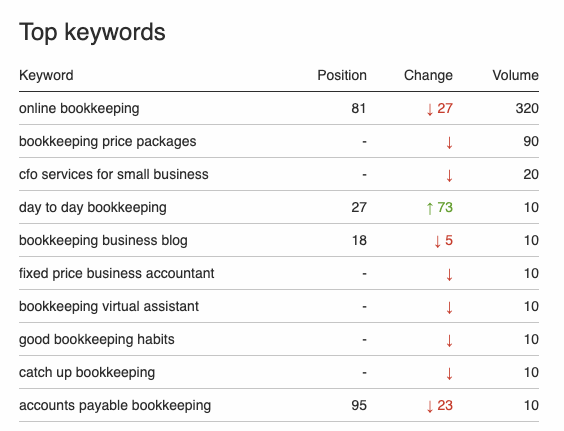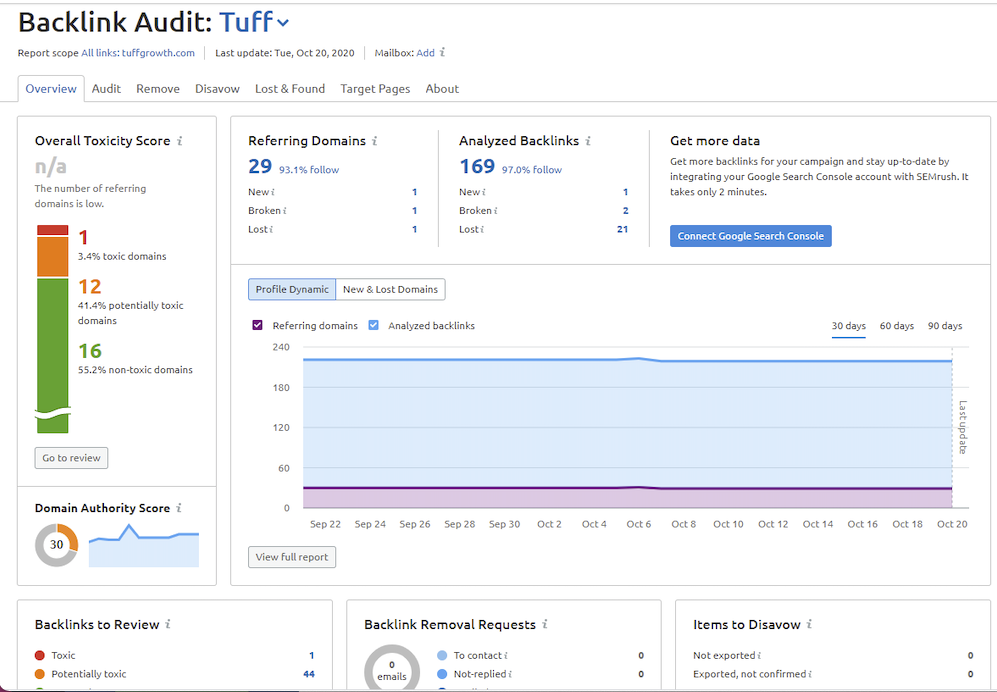Keyword Ranking Fluctuations: Why Does it Happen, What Can I Do About It?
You have worked hard and finally rank first overall in SERPs for that specific keyword you’ve been targeting.
Your site is gaining more traffic organically, and you are starting to see conversion rates increase.
Now that you rank highly, your authority increases, and you can start targeting more competitive keywords.
One day you check your traffic in Google Analytics to look for more non-branded keyword opportunities and notice that your traffic has started to decrease. Panicking— you look for reasons why you are no longer the top rank in SERPs.
You aren’t even on the first page anymore!
What have you done to deserve this? Why are you no longer ranking in SERPs when you were just a few days ago?
You didn’t change anything about the article, and the information is still all relevant, so what gives?
This is a common problem many marketers face— keyword ranking fluctuation.
What is Keyword Ranking Fluctuation?
Keyword ranking fluctuation is when the SERPs change for a keyword you are targeting. Google, like most companies, wants to provide as much value to the end user as possible. To do this, they roll out new algorithm updates, altering the search engine results page to find out which articles are best for the reader.
These tests can last from a few days to a few weeks. Most companies who see a change in their SERP position will return to their natural position once the tests are over. At the same time, some companies may see a more permanent change in their position.
When companies start to see a change in their rank, they begin to panic and change their article that already ranks highly. Sometimes for the worst.
Keyword ranking fluctuation is natural, temporary, and should be expected. However, the most important thing is not to panic and make an impulsive decision.
So why did Google choose your article to move down in position, and when should you start to care or panic?
What Causes Keyword Ranking Fluctuations?
Websites that recently started ranking for a keyword are much more susceptible to keyword ranking fluctuations. The longer you’ve ranked for a keyword, the less likely you will see a change in position.
However, how long your content has been published and providing value to the end user is not the only cause of keyword ranking fluctuation.
Google has a variety of factors they consider when they shake up the positions in SERPs. Here are a few of the most common causes of keyword ranking fluctuations.
Google Algorithm Updates
It is very common for Google to change its algorithm. It’s Google. They are always innovating and trying to be better.
Often, Google will roll out an algorithm update without telling anyone and will make the information public months later after testing and perfecting the changes.
Algorithm updates try to weed out content stuffed with keywords and is more focused on SEO tactics than actually providing value to the reader.
It’s always important to stay updated with Google algorithm updates to gain a competitive edge.
At Tuff, we always explain to clients that Google is going to rank the content that provides the most value to the reader the highest. Regardless of keywords and vanity metrics.
To keep it simple, write to provide value for the reader. Use natural language when talking about a subject, don’t stuff it with keywords.
Issues with the Platform You Are Using
There are a ton of great SEO tools to analyze your traffic and ranking in SERPs. Unfortunately, although they can be extremely helpful and provide valuable insights, they aren’t always 100% accurate.
Issues with the platform you are using are a common cause that companies see their keyword ranking fluctuate.
SEMrush is one of the best tools on the market, but it uses third party data that may not be up to date. The metrics they provide aren’t completely accurate. Your traffic could be higher or lower than what their data says, and the same goes for your ranking positions for certain keywords.
Don’t panic. Take the information with a grain of salt and give it some time to become more accurate before you make any changes.
Loss of Important Backlinks
Backlinks are essential in your page ranking. If other websites are linking to your content, it shows that you’re a thought leader and have authority in the space.
If you start to lose those backlinks because companies are linking to competing articles instead of yours, you may see your backlinks and ranking decrease.
You can analyze your backlinks with a variety of SEO tools, like SEMrush, and ahrefs.
Google Penalty
Google penalizes websites for a variety of red flags they find when crawling your pages. For example, you can be penalized for duplicate content, keyword stuffing, hidden links, or not being easily accessible for all users. Some of these are automatic, but others occur when Google pushes updates and recognizes something negative in your site.
If you are penalized by Google for duplicated content, it’s time to worry. Plagiarism isn’t acceptable, and neither is unoriginal content.
Your content should be original and be unique compared to the other search engine results. For example, if your content simply summarizes the top 3 articles for a keyword and doesn’t provide any additional insights or value, you will most likely see your position change.
Backend Site Issues
Common backend site issues that cause your rank to change include slow load times and other backend issues that are inconvenient for users.
Google wants the users to have a seamless experience. If your site has extremely slow load times, users are going to leave. And if users leave your site, that hurts your ranking.
If you notice a decrease in site traffic, it could be a result of your page speed. A page speed report can show you how fast your site is. Testing competing websites is a great way to gauge where to stand on the spectrum.
Pro tip: Images typically make up about 75% of total page weight when they aren’t optimized, resulting in longer load times. Optimizing your images is a great way to increase page speed and reduce load times.
Your Site Has Been Hacked
Site security plays a large role in how Google views and ranks your website. If your website has been hacked and no longer is secure or safe for users to enter, Google will reduce your rank to protect the user.
When Do You Need to Worry?
Keyword ranking fluctuations are only temporary for most companies and shouldn’t raise too much concern. It’s common for these changes to stay in place for 3 to 4 weeks. So don’t panic right away and give Google time to adjust.
If you still see that you are no longer ranking highly after a month or two, that should be a red flag, and changes should be made.
One of the best things to do is to look at competitor sites.
- Where are your competitors ranking?
- How were they affected, if at all?
- What are some of the websites that moved up in rank?
- What are they doing differently than you?
Odds are, the keyword ranking fluctuations didn’t only affect you. Your competitors should see a change in traffic and rank as well. Unless, as mentioned earlier, they have been the top result for years.
If you notice that you are the only one affected by these changes and it’s been longer than four weeks since the change, that should raise concern and you should take action.
What Can You Do About Keyword Fluctuations?
The true answer (the answer that no marketers want to hear) is that all you can do is wait and see. You need to give Google time to gather information and adjust accordingly. But, again, most websites will return to their normal position after 3 to 4 weeks.
If you don’t return to your normal position, there are a few things that you can do.
- Site audit
- Backlink audit
- Content remediation
- Competitor analysis
- Learn about the algorithm
Site Audit
Performing an audit on your own site is an easy way to evaluate your website’s overall performance and search engine friendliness. This is where you learn about page speed, site security, and how user-friendly your website truly is.
Backlink Audit
Backlink audits are similar to a site audit, but they strictly analyze the external sites that link to your content. Therefore, when performing a backlink audit, you should pay attention to the types of websites linking to your content, the quality of the backlinks, and how often websites link back to your website.
Content Remediation
Content remediation is something that most websites should do regardless of how high they rank or if their rank has changed. Information changes as time passes, and Google wants to see that websites are keeping up with the times. Your content might be missing key questions that readers have and want answered. Adding new relevant content and improving existing content can help get you back to the top of SERPs.
Competitor Analysis
A competitor analysis is a great way to discover what Google is looking for. If a competitor jumps above you in SERPs analyze their content.
- How does your content stack up to theirs?
- What are your competitors doing in their content that you aren’t?
- What questions are they asking and answering that you’re missing?
Competitor analyses are easy to perform and can provide valuable insight into what changes you need to make.
Learn about Google’s Algorithm Updates
Like we’ve said, Google is constantly innovating and updating its algorithm to provide the most value to the end user. Learning about the algorithm and staying ahead of the curve can give you a better understanding of what Google is looking for.
This is a lot easier than most people think. Twitter is a great place to gain some valuable insights. Both @RustyBrick and @DannySullivan are great Twitter follows that tweet daily updates on how Google’s algorithm is changing and how it may affect your website.
Overcoming Keyword Ranking Fluctuations
With so many different factors affecting your keyword rank, it can be hard to find the specific fault that is causing you to lose traffic and conversions. Therefore, the first step in overcoming keyword ranking fluctuations is knowing where to start and implementing the right strategy to improve results and increase conversions.
It’s important to remember that keyword ranking fluctuations are typically temporary and shouldn’t raise too much concern right away.
If you find that your SERP positions are falling too low, not returning to your average rank, and you aren’t reaching your goals as a result, our team at Tuff can help. We offer free growth strategy sessions and will analyze your current content strategy/performance to correct any keyword fluctuations you may be suffering from.
Need help overcoming keyword ranking fluctuations? Let’s talk.

Ellen is the founder at Tuff and one of the team’s core growth marketers. She is a versatile marketer with expertise in multiple channels – from ppc to seo to email to others – responsible for the experiments and testing. She is happiest when she’s on the ski hill or outside pointing her mountain bike downhill.








